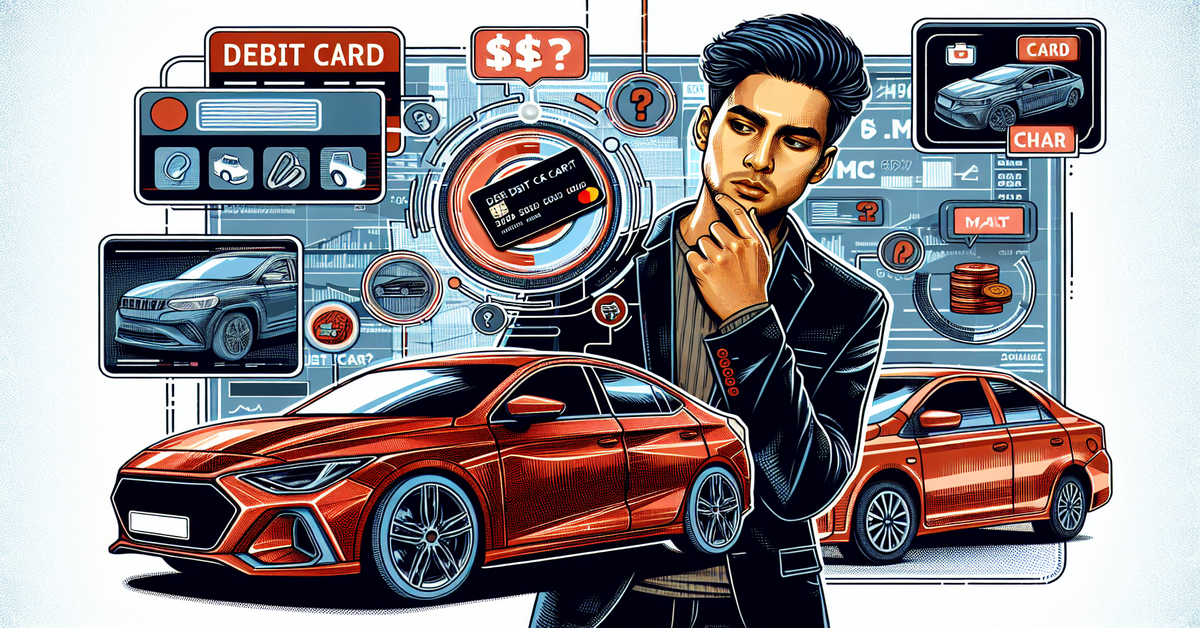You might be wondering if you can actually purchase a car with a debit card, and the answer is yes, but it's not as straightforward as it seems. Dealership policies can vary greatly, with some limiting transaction amounts or outright refusing debit card payments. Before you head to the dealership, it's essential to understand the potential limitations and prepare accordingly. So, what else do you need to know to guarantee a seamless purchase experience?
Understanding Debit Card Payments
When you're considering purchasing a car, understanding how debit card payments work can save you both time and potential headaches. Debit cards are linked directly to your bank account, which means you can only spend the funds available there. This offers a level of safety; you won't incur debt as with credit cards. However, many dealerships have transaction limits on debit card payments, often capping them at a few thousand dollars. You'll need to check these limits before you get to the dealership. Additionally, make sure your bank is notified of the transaction to avoid any holds or red flags. Knowing these details beforehand helps you navigate the purchasing process smoothly, guaranteeing you're financially secure while making your investment.
Pros of Using a Debit Card
Using a debit card for purchasing a car offers several advantages, from financial control to immediate transaction completion, making it an appealing option for many buyers. One key benefit is that you're spending your own money, which helps you avoid debt and potential interest charges. This approach gives you a clearer picture of your budget and prevents overspending. Additionally, transactions made with a debit card are generally processed quickly, allowing for immediate ownership transfer. You also benefit from enhanced security features, as many debit cards offer fraud protection. Plus, you can track your spending easily through bank statements, offering peace of mind. Overall, using a debit card can enhance your buying experience while maintaining financial safety.
Cons of Using a Debit Card
Despite its benefits, relying on a debit card for car purchases can present significant drawbacks, including potential transaction limits and lack of rewards. Many debit cards have daily spending caps that might not accommodate the cost of a vehicle, forcing you to find alternative payment methods. In addition, unlike credit cards, debit cards rarely offer cash back, points, or other incentives, meaning you miss out on potential rewards for such a large purchase. Moreover, using a debit card exposes your bank account directly to fraud risks, and while you can dispute unauthorized transactions, it may take time to recover your funds. These factors can lead to stress and complications, making it essential to weigh your options carefully before deciding.
Dealership Policies on Debit Cards
Steering through dealership policies on debit card transactions can be tricky, as not all dealerships accept them or may impose specific limits on their use. To guarantee a smooth purchasing experience, it is vital to understand the common dealership policies regarding debit cards:
- Acceptance: Some dealerships only accept credit cards, so always check beforehand.
- Transaction Limits: Many dealerships set a maximum amount you can charge on a debit card, which may not cover the entire car price.
- Identification Requirements: Be prepared to provide additional identification or proof of funds, as dealerships may want to verify your transaction for security reasons.
It's important to call ahead and clarify these policies to avoid any surprises during your car purchase. Your safety and comfort should always come first!
Transaction Limits and Fees
When it comes to purchasing a car with a debit card, understanding transaction limits and potential fees is key to ensuring a hassle-free experience at the dealership. Many banks impose daily transaction limits, often ranging from $500 to $5,000, which could prevent you from completing your purchase in one go. You'll want to check with your bank beforehand to know your specific limit. Additionally, some dealerships might charge processing fees for debit card transactions, which can add to your overall cost. It's essential to factor in these fees when budgeting for your car. By being informed about these limits and fees, you can avoid unexpected surprises and make your car-buying experience smoother and safer.
Preparing for the Purchase
Before making a car purchase with your debit card, it's crucial to prepare thoroughly to guarantee a smooth transaction and avoid any last-minute complications. Here are three key steps to make sure you're ready:
- Check Your Account Balance: Confirm you have enough funds to cover the full purchase amount and any potential fees to avoid overdrafts.
- Contact Your Bank: Inform them about the large transaction to prevent your card from being flagged for suspicious activity.
- Understand Dealer Policies: Research the dealership's payment policies, as some may have restrictions or fees associated with debit card transactions.
Alternatives to Debit Card Payments
If you're hesitant about using a debit card for your car purchase, there are several viable alternatives worth considering. One option is a bank transfer, which is secure and can often be done on the same day. Another possibility is using a credit card, allowing you to benefit from added protections and rewards, though be mindful of credit limits. Personal checks are also acceptable at many dealerships, but confirm their policy beforehand. Additionally, you could explore financing options through the dealership or your bank, which might offer competitive rates. Each alternative has its pros and cons, so weigh your choices carefully to guarantee a safe and smooth transaction. Always prioritize methods that provide you with peace of mind.
Legal Considerations for Car Purchases
Understanding the legal considerations involved in purchasing a car is essential to ensuring a smooth and compliant transaction. Here are three key aspects you should keep in mind:
- Contractual Obligations: Always read the purchase agreement carefully. Make sure you understand the terms, including any warranties or return policies.
- Title and Registration: Confirm that the seller has a clear title to the vehicle. You don't want any surprises with ownership disputes later on.
- Consumer Protection Laws: Familiarize yourself with your local consumer protection laws, which can provide additional rights and safeguards in case of disputes.
Being informed about these legal elements not only protects your investment but also contributes to a more secure buying experience.
Tips for a Smooth Transaction
Having a solid grasp of the legal considerations lays the groundwork for a smooth transaction when purchasing a car, so here are some practical tips to help you navigate the buying process effectively.
| Tip | Description | Safety Consideration |
|---|---|---|
| Verify Payment Limits | Check your debit card's transaction limit. | Avoid declines at the dealership. |
| Get a Purchase Receipt | Always obtain written confirmation. | Protects against disputes. |
| Stay Informed | Research the dealership's policies beforehand. | Know your rights and protections. |

